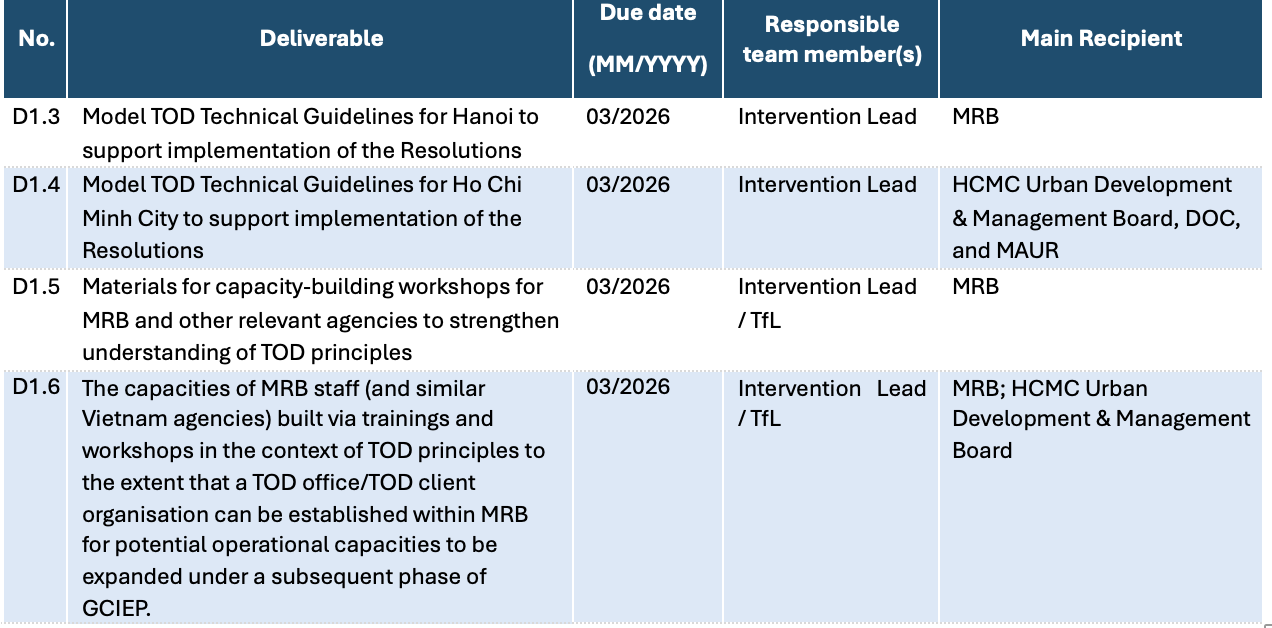
National Communications/ Stakeholder Engagement Expert
- On-site, Hybrid
- Hồ Chí Minh, Hồ Chí Minh, Vietnam
- Project Positions
Job description
GCIEP Overview
The Green Cities, Infrastructure and Energy Programme (GCIEP) is a demand-driven programme that drives sustainable green cities and climate-resilient infrastructure in lower-income countries. GCIEP is the core, demand-driven component of the UK's Green Cities and Infrastructure Centre of Expertise (GCI CoE). The programme supports the Foreign Commonwealth and Development Office (FCDO) to deliver the UK Government’s International Development Strategy through accelerating investment in, and delivery of, growth-enabling infrastructure and urban development that is responsible, reliable, inclusive, low-carbon and climate-resilient.
GCIEP is a high-ambition programme that targets transformational change in the enabling environment of its country partners that will deliver both immediate benefits and long-term development dividends for decades to come. The programme’s Theory of Change (ToC) targets the critical areas of support that will unlock these opportunities for countries – meeting these needs via Country Strategies that are tailored to the national and development context, and via innovative approaches that are drawn from UK expertise such as the whole systems approach to infrastructure design and resilience, and integrated urban planning and development. Key to the DNA of GCIEP is understanding how climate, gender, inclusion, investment and political economy analysis intersect and can be integral to its design and delivery. This gives the UK a clear and meaningful comparative advantage in this important and growing area of development practice.
Link to our website: https://ukgreencitiesandinfrastructure.org/
GCIEP Portfolio: Deep Offer Country
Country: Vietnam
Intervention name and code: DOC.VN02 – TOD and BIM
Workstreams / Work Package code: Workstreams 1, 2, 3, and 4
Locality: National
Expert Level: Senior Expert
Essential Skills / Qualifications required
Bachelor’s degree in communications, public relations, sociology, community development, urban planning, or related field.
Minimum of 7 years of professional experience in public communications, stakeholder engagement, or community outreach, preferably in infrastructure, urban development, or policy-related projects.
Proven track record of designing and implementing communication strategies for complex or sensitive projects.
Excellent verbal and written communication skills in Vietnamese, with strong ability to prepare clear, engaging, and culturally appropriate materials.
Strong facilitation and negotiation skills, with demonstrated ability to build trust and consensus among diverse stakeholder groups.
Ability to work effectively in a multidisciplinary and cross-cultural team environment.
Proficiency in MS Office and experience using digital platforms for outreach and engagement.
Technical Expertise
Experience in developing and delivering targeted messaging for public audiences on infrastructure, urban planning, or policy topics.
Understanding of the socio-political and cultural context of Vietnam, particularly factors that influence public perception of large-scale urban projects.
Familiarity with Transit-Oriented Development (TOD) concepts and their potential social and economic impacts.
Ability to anticipate and address community concerns proactively, including potential opposition to policy changes or developments.
Skilled in designing participatory consultation processes and ensuring inclusivity in stakeholder representation.
This role reports to: TOD Core Team
Does this role involve line management responsibility? No
Start Date: 07/09/2025
End Date: 31/03/2026 – Potential extension subject to FCDO’s approval for GCIEP’s extension (4/2026-4/2029)
Full time or Part time role: Part-time (approx. 5 days/ month)
Total number of days: 35 days (max.)
Intervention summary
This intervention builds on GCIEP’s ongoing support to Hanoi (via the Hanoi Metropolitan Railway Management Board - MRB) and Ho Chi Minh City (via the Department of Construction - DOC). To date, GCIEP has helped strengthen the enabling environment for Transit-Oriented Development (TOD) by delivering city-specific Diagnostic Reports identifying TOD opportunities and barriers; Land Value Capture (LVC) recommendations for each city; a Strategy Framework on TOD planning, financing, and operations; and capacity-building workshops for Hanoi and HCMC.
This work has supported significant policy progress, including the issuance of national-level Resolution 188 (February 2025) and draft city-level TOD and LVC Resolutions in both Hanoi and HCMC (expected to be adopted in Q3 2025). It has also contributed to improved institutional understanding of TOD and Building Information Modelling (BIM) among key stakeholders, including MRB, DOC, MAUR, and others.
However, policy advancement alone is not sufficient. Local authorities, developers, and consultants still lack hands-on experience in delivering TOD projects and applying BIM in practice. Once policies are adopted, they must be translated into technical guidelines and effectively implemented. Institutional capacity remains a critical bottleneck. As the designated TOD and BIM delivery bodies, MRB in Hanoi and the Management Authority for Urban Railways (MAUR) in HCMC must urgently strengthen internal staffing, technical capabilities, and management processes. Organisational development must evolve in tandem with these responsibilities to ensure these agencies can internalise best practices and function as capable, long-term implementers.
This phase therefore shifts GCIEP’s focus from policy development to strengthening technical and commercial practices, beginning with Hanoi and HCMC. The objective is to build institutional and market capacity to implement TOD and unlock investment for metro-rail expansion using mechanisms such as Land Value Capture. In parallel, GCIEP will engage other cities — including Da Nang, Can Tho, Vinh, and Nha Trang — through knowledge-sharing activities to expand the intervention’s national impact.
Planned Workstreams and Activities
Workstream 1: TOD Technical Guidelines & Capacity Building
Activity 1: Continued support for the development and refinement of TOD-related Resolutions in Hanoi and HCMC (carried over from Phase 1 – The Intervention Lead will be supported by the Strategic Advisor to lead the day-to-day tasks of this activity).
Activity 2: Development of two city-specific TOD Technical Guidelines, providing step-by-step implementation guidance aligned with each city's policies and resolutions. The guidelines will be practical, context-specific, and designed to maximise social, environmental, and economic outcomes.
Activity 3: Delivery of capacity-building workshops in Hanoi and HCMC (to be extended to other cities), using a ‘learning by doing’ approach to introduce TOD principles and guide the design and implementation process.
Activity 4: Support the establishment and development of a TOD Office within MRB, with strategic input from Transport for London (TfL). While this task will be led by GCIEP, TfL will provide primary technical input. The Urban Development Management Authority in HCMC will also be engaged in knowledge transfer activities led by TfL
Workstream 2: TOD Site Selection Methodology
Development of a methodology for identifying station-level TOD areas along selected brownfield and greenfield metro lines in Hanoi. This workstream will be led by the GCIEP Alliance, with technical support from TfL and Crossrail International (CI).
Workstream 3: MRB Tender Information Portal
Support MRB in enhancing the transparency and effectiveness of its Tender Information Portal. This workstream will be led by CoST with GCIEP Alliance programme input.
Workstream 4: Support MRB with the establishment of a proposed “BIM Unit”
Review and recommend organisational design options, share international best practices, and deliver capacity building to support the establishment of a BIM unit within MRB. This workstream is to be led by CI with GCIEP Alliance programme input.
Brief Overview of the role / Objectives
As the National Communications/ Stakeholder Engagement Expert, you will prepare environment-related analyses, recommendations, and contributions to project reports. Your role will include providing technical inputs, regularly reporting progress to the Intervention Lead, and proactively identifying and flagging emerging risks.
Tasks and Key Duties
Key responsibilities include:
Design and implement communication and engagement strategies to inform local communities and other stakeholders of TOD proposals and the benefits that they will bring with the aim of securing support for the project.
Develop culturally sensitive and accessible communication materials (e.g., briefs, infographics, presentations) to explain TOD concepts, benefits, and potential impacts.
Organise and facilitate public consultation sessions, workshops, and dialogues to gather feedback and address concerns.
Coordinate closely with the Intervention Lead, Deputy Intervention Lead, and other technical experts to ensure consistent and accurate messaging.
Review the Technical Guidelines being developed to determine impact on communications and aspects requiring specific communication needs.
Monitor public sentiment and media coverage related to TOD policies and provide recommendations for proactive engagement or issue management.
Document stakeholder feedback and provide inputs to refine TOD proposals to enhance public acceptability.
Build and maintain relationships with community leaders, civil society organisations, and other local influencers to support positive perception and buy-in for TOD initiatives.
Specific Deliverables
The National Communications/ Stakeholder Engagement Expert will contribute inputs to the following deliverables as indicated in the ToR:

or
All done!
Your application has been successfully submitted!
